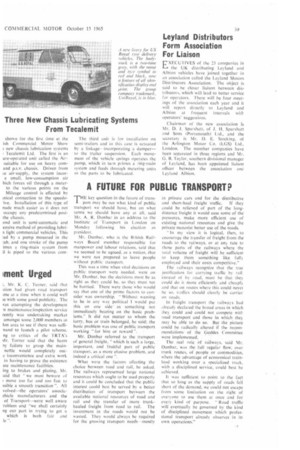A FUTURE FOR PUBLIC TRANSPORT?
Page 41

If you've noticed an error in this article please click here to report it so we can fix it.
THE key question in the future of trans7 port may be not what kind of public transport we should have, but on what terms we should have any at all, said Mr. A. R. Dunbar in an address to the Institute of Transport in London on Monday following his election as president.
Mr. Dunbar. who is the British Railways Board member responsible for manpower and labour relations, said that we seemed to be agreed. as a nation. that we were not prepared to leave people without public transport.
This was a time when vital decisions on public transport were needed, went on Mr. Dunbar. but the decisions must be as right as they could be, so they must not he hurried. There were those ssho would say that one of the prime factors to consider was ownership. "Without wanting to be in any way political I would put this on one sideas something not immediately bearing on the basic problems." It did not matter to whom the lorry, bus or train belonged, he said; the basic problem was one of public transport working "for hire or reward ".
Mr. Dunbar referred to the traiisport of general freight. " which is such a large, important, and fruitful part of public transport, as a more elusive problem. and indeed a critical one ".
What were the factors affecting the choice between road and rail, he asked. The railways represented large national resources which ought to be used properly and it could be concluded that the public interest could best be served by a better distribution of transport between the available national resources of road and rail and the transfer of more trunkhauled freight from road to rail. The investment in the roads would not be wasted. They would always be required for the growing transport needs—mostly
in private cars and for the distributive and short-haul freight traffic. If they could he relieved of part of the longdistance freight it would ease some of the pressures, make more efficient use of existing national resources and give the private motorist better use of the roads.
In my view it is logical, then, to encourage the transfer of freight from the roads to the railways, or at any rate to those parts of the railways where the total volume of freight will be sufficient to keep them something like fulls employed and their costs competitive."
The railways recognize that the true justification for carrying traffic by rail. instead of by road, must he that they could do it More efficiently and cheaply and that on routes where this could neve, be so. traffics should clearly be earriee on roads.
In freight transport the railways had already declared the broad areas in which they could and could not compete with road transport and those in which they may be able to do so. But the picture could he radically altered if the recOmmendationsT of the Cieddes Committee were implemented.
The real role of railways, said Mr. Dunbar, was the full regular flow, over trunk routes, of people or commodities, where the advantage of economical trainload working over a specialized track. with a disciplined service, could best he achieved.
It was sufficient to point to the fact that so long as the supply of roads fell short of the demand, we could not escape from some limitation on die right of evers one to use them at once and for every kind of purpose. " Road traffic will eventually be governed by the kind of disciplined movement which professional transport already observes in its own operations."








































































































































